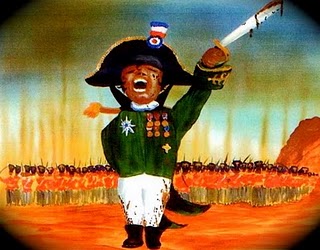
In the past four days, within the walls of M-Base, the Prince, chef de cabinet and I had agreed to oust the corrupt finance minister, to hold up the appointment of the top job at justice; they had reorganized—on paper—the police intelligence unit, staved off the minister of state from creating his own intelligence service—and relegated a would-have-been kitchen cabinet to the bathroom.
Now, the three of us sat in M-Base (cramped around a tiny kitchen table because of electrical works going on in the living room), and I made an impassioned plea for the Prince to name someone other than Philippe NARMINO as chief of judicial services.
The Prince’s concern: If not NARMINO, who else?
JLA had the answer: Request from France an interim magistrate to fill the position for two years while they further assess the situation. If NARMINO came out clean, he could still get the job, JLA reasoned, but if the Prince gave NARMINO the job now, it would be very difficult to remove him later on.
That got my vote, with this caveat: Ensure the French don’t send a Freemason.
Much earlier in his tenure, I had offered the Prince this sage advice: If in doubt, don’t.
Afterwards, I ascended Le Rocher, to the chambers of the Conseil Nationale, for a sit-down with President Stephane VALERI in his office.
Proust had been in to see VALERI, just before my arrival, to bitch about JLA.
“He wants to be the Number Two,” Jean-Paul PROUST had blubbered to VALERI about the chef de cabinet. “I am Number Two. I make decisions, not JLA.”
In fact, PROUST was mistaken. Monaco is an absolute monarchy, and its constitution, which JLA studied while preparing for his job, clearly states that the Palace, not the government, rules the principality; the government exists to execute the wishes of the Palace.
Unfortunately, during the last five years of Prince Rainier’s reign, the government had been chipping away at this power and had begun, unconstitutionally, taking it unto itself.
It was JLA’s job to bring power back to the Palace, where it rightfully belonged, with the Sovereign in command. And he was doing an excellent job, evidenced by ruffled feathers among the peacocks in government.
“JLA is treating me like a kid,” VALERI quoted PROUST as having said. “If he continues, I will leave.”
As I later said to the Prince, there is only one response for anyone threatening to leave: May I hand you your coat? Or even better, Choose a window.
VALERI was generally impressed by JLA’s first few weeks on the job. “The Cabinet used to be a cluster of old men of no consequence,” he told me. “JLA has shaped it into a formidable power.” It also put VALERI on edge; power was something he coveted for himself.
PROUST had enjoyed seven months of Albert’s rule without an effective chef de cabinet to lay down Palace rule, and had grown accustomed to making all the decisions.
It was the Prince’s own fault, for his summer of sloth, for his delaying and procrastinating and wasting precious time to firmly establish his rule. PROUST had gotten used to life dealing directly with a Sovereign who was easily distracted, focused mostly on his social life, and easy to manipulate.
But with JLA it was another story. Now PROUST was up against a formidable figure whose agenda was simple: To make the Prince understand and appreciate his own power, and to assist him in the execution of such power with objectivity, focus, intelligence, and the high ethical stance the Prince had already promised to his subjects and the world.
That was why JLA had accepted the job as chef de cabinet.
And that was also why, three-and-a-half years earlier, I had signed on as spymaster.
PROUST's misperception of the situation was that JLA was making decisions in the Prince’s name. He was not. The reality was this: The Prince finally had a shield so that PROUST, and others, could not (at least in principle) talk him out of what he wanted.
Another man with another knife.
JLA telephoned me late that evening after speaking with the Prince. He told me the Prince was shocked that Thierry LACOSTE and his Paris clique would try to form a kitchen cabinet.
As for PROUST, JLA was already aware of the minister of state’s disposition toward him. “At Tuesday’s meeting he acted like a child,” said JLA.
The problem was this: Every weekend JLA would fly home to his family in Paris. And every weekend, the knives would come out and cut away at all he had accomplished during the week.
In fact, “Number Two” made a weekly habit of waiting until JLA departed for the weekend, and then, like a silent-but-deadly cheezer, snuck in to see Albert late on Friday afternoon, specifically to turn the Prince around on anything he had decided during the working week with JLA.
And Albert would usually oblige him.